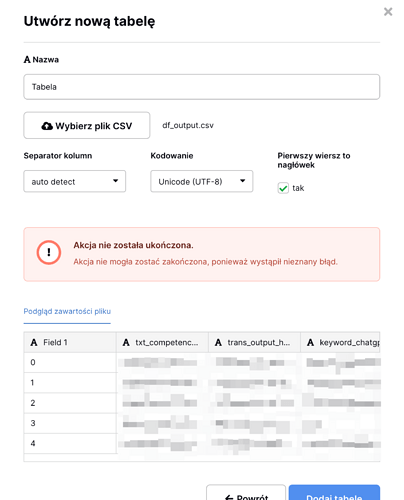Hello,
I run the latest version of Baserow in a Docker container under Caprover, the command line is
docker run
–name=srv-captain–xxxxx-baserow.1.xxxxxxxxxxxxxxxxxxxxxxxxx
–hostname=000000000000
–env=BASEROW_PUBLIC_URL=https://xxxxxxxxxxxxx.xxxxx.xxxxxxxxxxxxx.xxx
–env=DATABASE_HOST=xxx-xxxxxxx–xxxxx-xx
–env=DATABASE_NAME=postgres
–env=DATABASE_USER=postgres
–env=DATABASE_PASSWORD=xxxxxxxxxxxxxxxx
–env=DATABASE_PORT=5432
–env=FROM_EMAIL=noreply@xxxxxxxxxxxxx.xxx
–env=EMAIL_SMTP=yes
–env=EMAIL_SMTP_HOST=smtp.mandrillapp.com
–env=EMAIL_SMTP_PORT=587
–env=EMAIL_SMTP_USER=xxxxxxxxx
–env=EMAIL_SMTP_PASSWORD=xxxxxxxxxxxxxxxxxxxxxx
–env=PATH=/usr/local/sbin:/usr/local/bin:/usr/sbin:/usr/bin:/sbin:/bin
–env=UID=9999
–env=GID=9999
–env=DOCKER_USER=baserow_docker_user
–env=DATA_DIR=/baserow/data
–env=BASEROW_PLUGIN_DIR=/baserow/data/plugins
–env=POSTGRES_VERSION=11
–env=POSTGRES_LOCATION=/etc/postgresql/11/main
–env=BASEROW_IMAGE_TYPE=all-in-one
–expose=80
–log-opt max-size=512m
–runtime=runc
–detach=true
baserow/baserow:1.14.0 start
I am trying to create a new table by uploading a medium-size CSV file (25mb).
Baserow fails with the following error:
[BACKEND][2023-01-30 22:34:07] [2023-01-30 22:34:07 +0000] [336] [ERROR] Exception in ASGI application
[BACKEND][2023-01-30 22:34:07] Traceback (most recent call last):
[BACKEND][2023-01-30 22:34:07] File “/baserow/venv/lib/python3.9/site-packages/uvicorn/protocols/http/httptools_impl.py”, line 375, in run_asgi
[BACKEND][2023-01-30 22:34:07] result = await app(self.scope, self.receive, self.send)
[BACKEND][2023-01-30 22:34:07] File “/baserow/venv/lib/python3.9/site-packages/uvicorn/middleware/proxy_headers.py”, line 75, in call
[BACKEND][2023-01-30 22:34:07] return await self.app(scope, receive, send)
[BACKEND][2023-01-30 22:34:07] File “/baserow/venv/lib/python3.9/site-packages/channels/routing.py”, line 71, in call
[BACKEND][2023-01-30 22:34:07] return await application(scope, receive, send)
[BACKEND][2023-01-30 22:34:07] File “/baserow/venv/lib/python3.9/site-packages/django/core/handlers/asgi.py”, line 149, in call
[BACKEND][2023-01-30 22:34:07] body_file = await self.read_body(receive)
[BACKEND][2023-01-30 22:34:07] File “/baserow/venv/lib/python3.9/site-packages/django/core/handlers/asgi.py”, line 181, in read_body
[BACKEND][2023-01-30 22:34:07] body_file.write(message[‘body’])
[BACKEND][2023-01-30 22:34:07] File “/usr/lib/python3.9/tempfile.py”, line 894, in write
[BACKEND][2023-01-30 22:34:07] rv = file.write(s)
[BACKEND][2023-01-30 22:34:07] OSError: [Errno 28] No space left on device
The error is not accurate, there is plenty of space on the host server, as well as in the container.
In the source code I could find ‘tempfile’ usage only in ‘import_from_airtable.py’ and ‘backup_runner.py’ files, I don’t think that’s any of them.
Any ideas?
